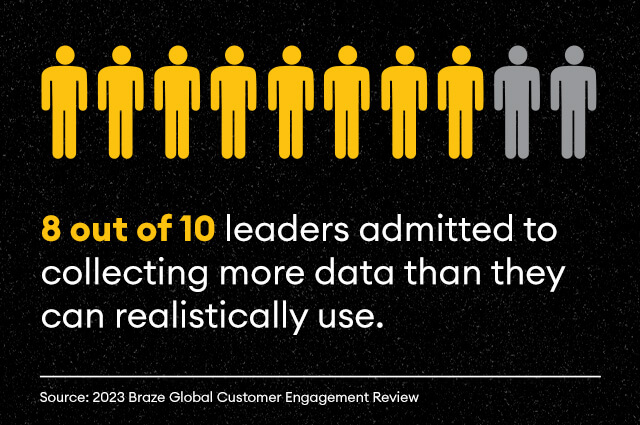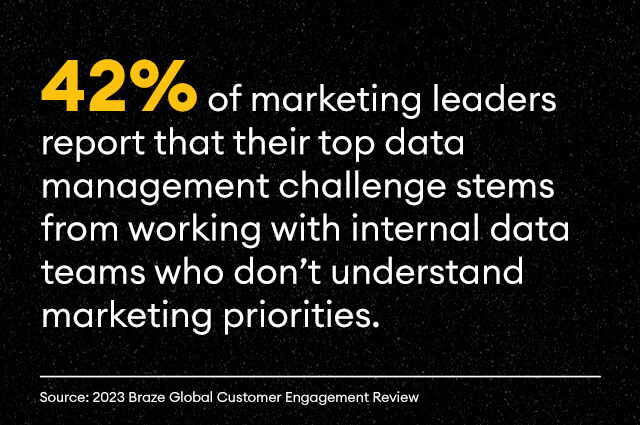Data quality management empowers business success
Data quality plays a crucial role in the business landscape when it comes to informing strategy and enabling growth. As organizations strive to do more (or at least the same) with less, mastering data quality management is imperative. Collecting and analyzing the right data points can help you retain customers, enhance customer experiences, optimize campaigns, boost acquisition, and achieve sustainable growth even as the economy shifts.
But in today’s data-driven environment with evolving tracking technology, compliance demands, and AI disrupting the status quo, problems with data quality and quantity problems are amplified. And these issues come with a steep price: misinterpreted insights, wasted resources, and even concerns with ethics, transparency, and consumer privacy.
Effective data quality management is complex, but it doesn’t have to be. Understanding the causes and consequences of poor data quality, finding a source of truth, building a data-driven culture, and working with the right data enablement partner all come together to empower informed decisions that lead to outstanding experiences.
Missed opportunities: Causes and consequences of poor data quality
Once upon a time, CMOs and growth leaders spent their days thinking about brand strategy with creative license and assumed success came from stellar messaging. But today, these roles hinge on emerging technology, marketing agility, and driving ROI while expecting immediate results — all of which depend on quality data.
Statistics reported in the 2023 Braze Customer Engagement Review indicate that more than one-third of marketing leaders cite the collection, integration, management, and accessibility of data as their top challenges when it comes to customer engagement.
These data challenges come in many different forms. Here are a few common problems in marketing data quality management:
More data, more problems
Organizations often find themselves drowning in a sea of information in the era of big data. According to the Braze survey mentioned above, a staggering eight out of every ten leaders surveyed admitted to collecting more data than they can realistically use.

Data down the drain
With so much data at hand, so much goes to waste. Experian’s most recent data experience research report stated that an estimated 73% of all collected marketing data goes unused. Overcollected and underutilized data can come with high costs, ranging from consumer privacy risks to wasted resources.
Standardization struggles
A lack of standardization and guidelines in your data strategy leads to all kinds of complications. Inconsistencies across systems and departments create confusion, and inaccurate data can mislead decision-making processes. Incomplete data leads to gaps in insights, while outdated data fails to reflect the current reality. This results in unreliable data and an inability to inform strategy.
Disparate times, disparate measures
Fragmented data is a major challenge for many (if not all) organizations. According to a study conducted by Wakefield Research, 441 of the 450 senior data leaders surveyed indicated that data silos exist within their organization. In addition, 311 of the same leaders report they have “trapped” data they cannot access. Rescuing trapped data can open opportunities for actionable insights.
What happens when organizations unlock trapped data? You’ll find untapped insights into user interactions that allow you to create outstanding customer experiences. Learn more about Tallwave’s success with data unification and enablement strategy.
Left brain, right brain
What causes all the data debacles? It could be that marketing people and data people don’t always speak the same language. Braze found that 42% of respondents reported that their top data management challenge stems from working with internal data scientists and IT departments who don’t understand marketing priorities. The second biggest challenge is that marketing talent lacks data skills.

Data mismanagement comes with consequences that can be summarized in two words: missed opportunities. Without a data-driven strategy, you’ll likely end up with wasted resources and miss out on what matters: customer retention, acquisition, and growth.
Seizing opportunities: 4 considerations for collecting quality data
Access to high-quality data enables business leaders to better understand their customers: their needs, preferences, expectations, and buying habits. This understanding helps companies successfully satisfy and engage customers, increase brand awareness, and drive sales conversions.
While ongoing data quality management might feel like an uphill battle, there are a few best practices you can implement to harness the power of accessible analytics.
Here are four actionable steps to consider:
- Align data collection with business goals: Start by aligning your data collection efforts with your organization’s goals and objectives. By focusing on the data that truly matters, you can avoid the trap of over-collection and instead gather the insights necessary to drive meaningful actions.
- Standardize data across systems and departments: Establishing data standardization protocols is vital to ensure consistency and accuracy. Implementing standardized data models, formats, and definitions across systems and departments fosters a unified view of the data and enhances its reliability.
- Implement data validation and verification processes: Introduce robust data validation and verification processes to maintain data integrity. These processes involve checking for completeness, identifying and resolving inconsistencies, and ensuring data accuracy through various validation techniques.
- Invest in data cleansing, enrichment, and visualization tools: Leverage data cleansing and enrichment tools to improve the quality of your data. These tools can help identify and rectify errors, fill in missing information, and enhance the overall value of your data. Additionally, data visualization tools and dashboards give stakeholders the context they need to gain actionable insights from complex data sets.
Data-driven culture: Collaboration and metrics that matter
To truly master data quality management, organizations need to foster a data-driven culture. This kind of environment empowers leaders to put facts before instincts and take valuable action with each decision.
Unified team, unified data strategy
A data-driven culture is fueled by connection. The symbiotic relationship between data scientists and marketing specialists enables realizing your analytics tools’ full potential, allowing your organization to make data-driven decisions and achieve greater results. When marketing teams and data teams combine forces and truly understand each other, priorities are aligned.
Prioritizing data quality lets you unlock valuable insights, reach your target audience more effectively, and ultimately enhance customer experiences while maximizing the return on your marketing investment.
The first step in creating a culture defined by data is finding a data strategy and analytics partner who truly understands the metrics that matter. A true enablement partner, like Tallwave, can help you narrow down the most relevant data points to avoid overcollection and support unification. You’ll have access to meaningful insights that drive positive outcomes.
Ready to embrace data enablement? Let’s chat. We can work together to create a unified data strategy that gives you the information needed to implement outstanding experiences. Reach out to Tallwave now.


